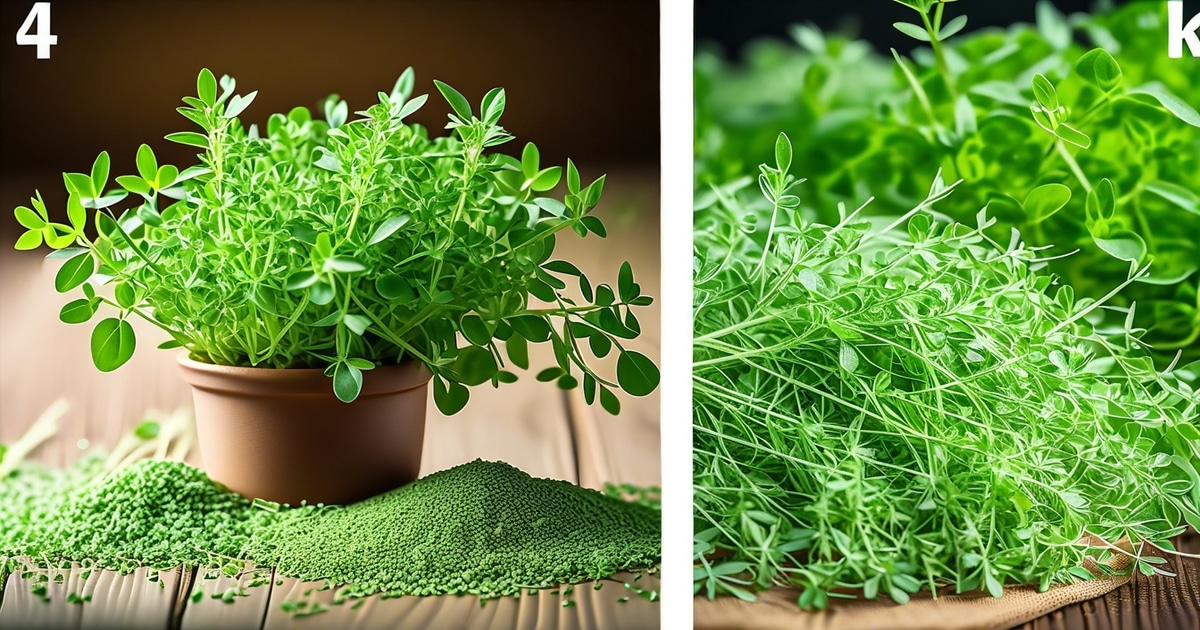Key Takeaways
-
Incorporate powdered alfalfa into your daily diet by adding it to smoothies, salads, or soups for a nutrient boost.
-
Enjoy the health benefits of powdered alfalfa, such as metabolic enhancement and improved digestion, by consuming it regularly as part of a balanced diet.
-
Manage specific health conditions, like high cholesterol or arthritis, by incorporating alfalfa powder into your wellness routine after consulting with a healthcare professional.
-
Prioritize safety when consuming alfalfa powder by adhering to dosage guidelines and being aware of potential side effects, especially for individuals with certain health conditions.
-
Store powdered alfalfa properly in a cool, dry place to maintain quality and maximize its shelf life.
-
Consider special considerations, such as interactions with medications or allergies, before incorporating alfalfa powder into your diet.
Did you know that powdered alfalfa has 10 times more minerals than regular veggies? It’s good for you and can help your body in many ways. It can clean out toxins, help digestion, and make you feel better overall. Powdered alfalfa could be what you need if you want more energy or need more nutrients.
Nutritional Profile of Powdered Alfalfa
Essential Vitamins and Minerals
Powdered alfalfa is packed with essential vitamins and minerals, making it a valuable addition to your diet. It contains high levels of vitamin K, which supports bone health and blood clotting. It’s rich in vitamin C, an important antioxidant that boosts the immune system. This nutrient-dense powder also provides a good dose of calcium for strong bones and teeth.
Alfalfa powder is an excellent source of iron, magnesium, and potassium minerals. Iron is crucial for transporting oxygen throughout the body, while magnesium plays a role in hundreds of biochemical reactions. Potassium helps regulate fluid balance, muscle contractions, and nerve signals.
Protein and Fiber Content
One standout feature of powdered alfalfa is its impressive protein content. This superfood offers an attractive option for individuals following a plant-based diet or looking to increase their protein intake naturally.
Moreover, powdered alfalfa boasts a significant amount of dietary fiber. Fiber aids digestion by promoting regular bowel movements and supporting gut health. It also helps control blood sugar levels by slowing down the absorption of sugar into the bloodstream.
Antioxidants and Chlorophyll
In addition to its abundant essential nutrients like vitamins A and E—powerful antioxidants—powdered alfalfa contains chlorophyll. This green pigment found in plants has various health benefits, including detoxification support due to its potential ability to bind to heavy metals.
Incorporating powdered alfalfa into your daily routine can help fortify your body with these vital nutrients while offering additional health-promoting properties.
Incorporating Powdered Alfalfa into Your Daily Diet
Nutritional Boost in Smoothies and Shakes
Powdered alfalfa is great for your diet, especially in smoothies or shakes. It makes your drinks healthier without changing the taste. Just a little bit can give you more plant nutrients and vitamins.
Also, consider blending fresh alfalfa sprouts with the powdered form for an extra nutritious punch. The combination creates a potent blend that contributes to overall health and provides a refreshing flavor profile to your drink.
Salad Dressings and Toppings
Another creative way to incorporate powdered alfalfa into your diet is by mixing it into homemade salad dressings or sprinkling it on top of salads. This simple addition elevates the nutrient content of your meal while offering a delightful texture. The plant compounds in powdered alfalfa contribute significantly to its potential benefits, making it an excellent choice for enhancing the nutritional quality of salads without much effort.
Consider experimenting with different types of salads, such as green or grain-based ones, and observe how incorporating powdered alfalfa affects taste and nutritional value.
Health Benefits and Metabolic Enhancement with Alfalfa Powder
Digestive Health
Powdered alfalfa is known for its ability to support digestive health. The high fiber content in alfalfa powder can aid in regulating bowel movements and promoting a healthy gut. This can help prevent constipation and promote regularity, contributing to overall digestive wellness.
Consuming alfalfa powder may also assist in maintaining a healthy weight by promoting a feeling of fullness, which can reduce overeating. Supporting optimal digestion may contribute to better absorption of nutrients from your food, helping your body function more efficiently.
Metabolism and Anti-Inflammatory Properties
Incorporating powdered alfalfa into your diet may aid in metabolic enhancement. Alfalfa contains bioactive compounds that could impact blood sugar levels, potentially aiding metabolism regulation.
Moreover, the plant compounds found in Medicago sativa, such as antioxidants, have potential anti-inflammatory properties. These antioxidants work against free radicals that cause oxidative stress within the body. By combatting free radicals, alfalfa powder may reduce inflammation within the body.
Incorporating this nutrient-dense ingredient into your daily diet has shown promising effects on various aspects of health, including digestive health maintenance and metabolic enhancement through its bioactive compounds.
Managing Specific Health Conditions Using Alfalfa Powder

Lowering Cholesterol Levels
Powdered alfalfa contains compounds that may help lower cholesterol levels. The plant sterols found in alfalfa powder can interfere with the absorption of dietary cholesterol in the body. Doing so can reduce overall cholesterol levels, especially low-density lipoprotein (LDL) or “bad” cholesterol.
The fiber content in alfalfa powder can also aid in lowering cholesterol. Fiber helps remove excess cholesterol from the body by binding to it and promoting its excretion through waste elimination processes.
Blood Sugar Regulation Benefits
For individuals at moderate risk for diabetes or those already diagnosed with diabetes, consuming powdered alfalfa might offer potential benefits for blood sugar regulation. Studies have suggested that certain compounds present in alfalfa could help improve insulin sensitivity and lower blood sugar levels.
Moreover, the high fiber content of alfalfa powder, when taken as part of a balanced diet, can slow down the release of glucose into the bloodstream after meals. This mechanism may assist individuals in managing their blood sugar levels more effectively.
Supporting Arthritis Symptoms Management
People dealing with arthritis symptoms might find relief by incorporating alfalfa powder into their diets. The rich concentration of vitamins C and K and minerals like calcium and magnesium found in powdered alfalfa may play a supportive role in managing joint pain and inflammation associated with arthritis.
Furthermore, some components within alfalfa powder, such as saponins and flavonoids, possess anti-inflammatory properties that could alleviate discomfort caused by autoimmune diseases like rheumatoid arthritis.
Safety, Side Effects, and Dosage Guidelines for Alfalfa Powder
Considerations for Blood Thinners
If you are taking blood thinners, it’s crucial to consult your healthcare provider before using powdered alfalfa. Alfalfa contains vitamin K, which can interfere with blood-thinning medications. Your doctor can advise on the safe use of alfalfa powder alongside your prescribed medication.
Powdered alfalfa may cause gas or diarrhea when consumed in high doses. To minimize these potential side effects, start with a small amount and gradually increase as tolerated. This approach allows your body to adjust to the fiber content present in alfalfa.
Recommended Dosage
For general use, the recommended dosage of alfalfa powder is typically around 500 mg to 1,000 mg daily. It’s important to follow the guidelines provided by the manufacturer or consult a healthcare professional for personalized recommendations based on individual health needs.
When incorporating powdered alfalfa into your routine, monitoring how your body responds is essential. Pay attention to any changes in digestion or overall well-being as you introduce this supplement.
Special Considerations for Alfalfa Powder Consumption
Autoimmune Conditions
Powdered alfalfa might not be good for people with autoimmune conditions because it can worsen their symptoms. Some autoimmune conditions include rheumatoid arthritis, lupus, and multiple sclerosis. If you have an autoimmune condition, talk to your doctor before using powdered alfalfa.
Consuming powdered alfalfa without medical guidance could adversely affect the immune system, worsening the condition.
Medication Interactions
Be careful if you’re taking powdered alfalfa with certain medicines. Like, if you’re on blood thinners or aspirin, alfalfa could make you bleed more. And if you have diabetes, watch out for your blood sugar levels when using alfalfa powder.
Consulting a healthcare provider is critical before starting any new supplement regimen involving powdered alfalfa, especially if you are currently taking prescription medications.
Preserving the Quality of Alfalfa Products through Proper Storage

Ideal Storage Conditions
It’s crucial to store it in a cool, dry place away from sunlight. This helps maintain its freshness and prevents degradation. Airtight containers are also essential as they protect the powder from moisture and air exposure, which can lead to spoilage.
Proper storage not only ensures the longevity of powdered alfalfa but also safeguards its nutritional value. Checking expiration dates and following specific storage recommendations on the packaging is vital for maintaining its quality over time.
Safe Packaging Methods
Sturdy pet jars or aluminum packaging can help prevent damage during shipment or handling to maintain powdered alfalfa’s integrity. These materials protect external elements that could compromise the product’s quality.
It’s super important to store and package powdered alfalfa the right way. If done wrong, bacteria can get in and mess things up. But if we do it right, we can ensure the alfalfa stays good and safe and won’t waste any of it. This helps keep the environment healthy, too.
Closing Thoughts
You’ve now grasped the incredible benefits of incorporating powdered alfalfa into your daily routine. From its impressive nutritional profile to its potential in managing specific health conditions, alfalfa powder is a wellness powerhouse. Remember, before adding any new supplement to your regimen, it’s crucial to consult with a healthcare professional to ensure it aligns with your individual needs and doesn’t interact with any existing medications. So go ahead, explore the possibilities of alfalfa powder, and take charge of your well-being!
Frequently Asked Questions
Is powdered alfalfa a good source of nutrients?
Yes, powdered alfalfa is a powerhouse of essential nutrients such as vitamins, minerals, and antioxidants. It contains high levels of vitamin K, calcium, and chlorophyll, contributing to its nutritional value.
How can I incorporate powdered alfalfa into my daily diet?
You can easily add powdered alfalfa to your smoothies and juices or sprinkle it over salads and soups for an extra nutrient boost. It’s versatile and can be seamlessly integrated into various recipes.
What are the health benefits of consuming alfalfa powder?
Alfalfa powder offers metabolic enhancement, aids in digestion, supports liver health, and may help lower cholesterol levels. When incorporated into a balanced diet, its rich nutrient content also contributes to overall well-being.
Can powdered alfalfa help manage specific health conditions?
Powdered alfalfa has been associated with managing conditions like arthritis due to its anti-inflammatory properties. However, it’s important to consult a healthcare professional before using it for specific health concerns.
Are there any safety considerations or side effects related to consuming powdered alfalfa?
While generally safe for most people when consumed in moderation, some individuals may experience allergic reactions. Excessive intake may lead to digestive discomfort or interact with certain medications.

